Puruṣottama-Mahātmyaṁ (Skanda Purāṇam, Viṣṇukhaṇḍa)
Chapter 1
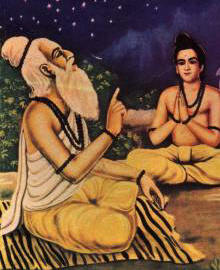 Once, the sages gathered around maharṣi Jaimini and addressed him, “ O great one! You have the knowledge of the entire śāstras and you know the greatness of all the pilgrimages. Earlier you had mentioned the name of the most sacred and great pilgrimage called Puruṣottama kṣetra (region), where paramapuruṣa Śrī-Iśa Lord Nārāyaṇa Himself has assumed the form of a wooden body by emerging from a glow of light. Such is the greatness of the place that anyone having a glimpse of the lord is liberated instantaneously. Please describe to us in detail as to who constructed this great kṣetra and how it came into being. Tell us, how is it possible for Nārāyaṇa to exist in a wooden form”. Jaimini replied that he had heard the details of this kṣetra from Kārtikeya, when he had narrated it atop Mandār Parvat (mountain) in a gathering of gods and learned men. Those who hear these narrations are freed from the evils of tamo guṇa but those who are not inclined towards Viṣṇu, will remain indifferent upon hearing such descriptions. Jagannath, who is the cause of all creation and destroyer of sins, exists in many pilgrimages, but this kṣetra is the most superior, as the Lord Himself exists here in His own body. The great God Himself assumed a wooden form and established himself in this temple. Those who visit the place have their sins destroyed and those who view the Lord are fortunate beyond description.
Once, the sages gathered around maharṣi Jaimini and addressed him, “ O great one! You have the knowledge of the entire śāstras and you know the greatness of all the pilgrimages. Earlier you had mentioned the name of the most sacred and great pilgrimage called Puruṣottama kṣetra (region), where paramapuruṣa Śrī-Iśa Lord Nārāyaṇa Himself has assumed the form of a wooden body by emerging from a glow of light. Such is the greatness of the place that anyone having a glimpse of the lord is liberated instantaneously. Please describe to us in detail as to who constructed this great kṣetra and how it came into being. Tell us, how is it possible for Nārāyaṇa to exist in a wooden form”. Jaimini replied that he had heard the details of this kṣetra from Kārtikeya, when he had narrated it atop Mandār Parvat (mountain) in a gathering of gods and learned men. Those who hear these narrations are freed from the evils of tamo guṇa but those who are not inclined towards Viṣṇu, will remain indifferent upon hearing such descriptions. Jagannath, who is the cause of all creation and destroyer of sins, exists in many pilgrimages, but this kṣetra is the most superior, as the Lord Himself exists here in His own body. The great God Himself assumed a wooden form and established himself in this temple. Those who visit the place have their sins destroyed and those who view the Lord are fortunate beyond description.
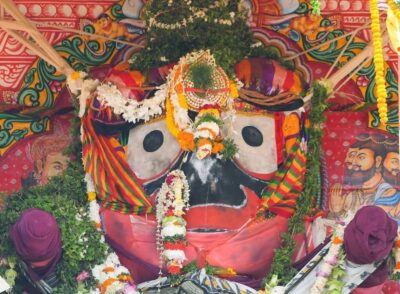
This miraculous region extends for 10 yojanas, stretching from the sea to the sands; amidst which is located, the immense blue mountain, ennobling and beautifying the place. Viewed from afar, it appears as if it is a breast of this earth. During pralaya, when Viṣṇu in the form of Varāha rescued the world from obliteration, Brahmā decorated the resurrected earth by surrounding it with mountains and beautifying it, and divided it by creating regions and pilgrimages; but the labour of creation burdened him. He worried as to how he could relieve himself from this enormous task and at the same time was concerned how the reborn souls would obtain liberation or moksha. Desirous of a solution, he worshipped Viṣṇu: “O Śaṅkha-Chakra-Gadādhārī (the one who holds the śaṅkha, chakra and gadā), you are the world and I am the creator; despite it, I was born in your naval-lotus. I salute you. O Soul of the World, I know you as the Paramātmā. It is your illusionary power, which created this eternal, immense universe. The śabda Brahmā, divided in three as Om Tat Sat, emerged from the inhalation and exhalation of your breath. Taking shelter in this Om Tat Sat, I created this world. You are undifferentiated from that, which is gross, and that which is fine; that which is long and that which is short. The way gold transforms into alloys when contaminated, similarly, you have assumed the form of this huge universe in the various forms of the three guṇas, sattva, rajas and tāmas. O Lord of the Universe, you are the creator as well as the created, you are the protector and the protected, you are the form as well as the beholder and the beheld. All living beings perform their actions, good and bad, under your control and as directed by you, and reap the fruits of these actions. O Great Lord, you are the way (gati) for the world, you are the protector, and you are the witness. O Merciful One, you are the guru of this universe and its seed. O Jagannath, I am eternally at your mercy, please be happy with me.”
Jaimini told the sages, that Viṣṇu then appeared before Brahmā, blue as a water-filled cloud, marked by the śaṅkha, chakra and gadā, His face aglow like a lotus and astride Garuḍa. Viṣṇu told Brahmā that since the Eternal was now bound to māyā and karma, birth and death were unavoidable. As Brahmā’s desire to know was deep, Viṣṇu told him how to escape this cycle and remain unborn and undying. He said that in this universe, both He and Brahmā were undifferentiated; what Brahmā desired, so did Viṣṇu.
Viṣṇu said, “The country, which is located north of the seacoast and south of the Mahānadī river, will yield the fruits of all the pilgrimages of this world. The residents of this place are blessed with good thoughts and intelligence and are enjoying the fruits of their good work from past births. Those who have not done at least a little good karma and is not devoted to Me cannot be born in this land. The region extending between the one-mango garden (Ekāmrakānan) Bhubaneśwar and the coasts of the southern sea is even more sacred than the region mentioned earlier. The blue mountain that is situated on the seacoast is the most secretive spot on earth and is even beyond your reach. It is unknown to the gods and demons and shrouded by an illusion. When I leave everybody around me, discarding even the company of the gods and the enmity of the demons, I assume a body and dwell permanently in this Puruṣottama kṣetra. This region lies beyond the cycle of creation and destruction. O Pitāmaha, if you go there you will get a vision of me similar to the one you are beholding now, marked with the chakras etc. In the middle of the blue mountain, there is an akṣay vaṭa, in the northeast of which is a tank called Rouhin. Those who bathe in this tank and view me on its banks with their naked eyes will be purified having washed off their sins and blessed by my presence. O Brahmā, please travel to this region. Upon seeing me there, meditate upon my form and you will be stunned by the magnitude of this region’s majesty. I created an illusion by which the knowledge of this region remained hidden and beyond the grasp of the srutis, smṛtis, history and purāṇas. As I am pleased with your invocation, the secret of this place will be revealed to all. Spending a day and a night in this place yields the combined fruits of performing vratas (fasts), tirthas (pilgrimages), yajnas (sacrifices) and dānas (charity). Spending even a moment in this area, the fruits of the aśvamedha yajna are received”. So speaking, Viṣṇu departed.
Chapter 2
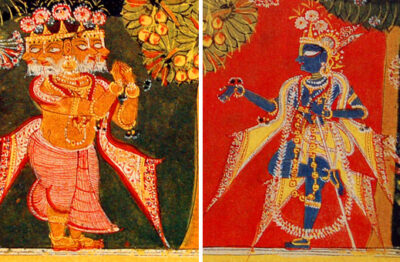 Jaimini said, Brahmā, following Viṣṇu, then proceeded to the region thus described, and saw the same śaṅkha-chakra-gadā holding Lord Nārāyaṇa, who had appeared before him earlier. Flooded with pleasure, Brahmā started singing His eulogy, when a thirsty crow appeared. The crow took a dip in the water of the Rouhin and threw itself repeatedly on the ground in front of Lord Viṣṇu. Soon the soul of the crow left its bird body and assuming the form of a śaṅkha-chakra-gadā holding idol, took its place on Viṣṇu’s side. Brahmā, the sages and the ascetics present marveled at the crow’s divine form and thought that in this manner gradually, the entire creation would dissolve and be reduced to the One. Even in the vedānta, there are doubts regarding the concept of man’s liberation from this birth, but nothing is beyond the understanding of the devotees of Viṣṇu, who hail from this region.
Jaimini said, Brahmā, following Viṣṇu, then proceeded to the region thus described, and saw the same śaṅkha-chakra-gadā holding Lord Nārāyaṇa, who had appeared before him earlier. Flooded with pleasure, Brahmā started singing His eulogy, when a thirsty crow appeared. The crow took a dip in the water of the Rouhin and threw itself repeatedly on the ground in front of Lord Viṣṇu. Soon the soul of the crow left its bird body and assuming the form of a śaṅkha-chakra-gadā holding idol, took its place on Viṣṇu’s side. Brahmā, the sages and the ascetics present marveled at the crow’s divine form and thought that in this manner gradually, the entire creation would dissolve and be reduced to the One. Even in the vedānta, there are doubts regarding the concept of man’s liberation from this birth, but nothing is beyond the understanding of the devotees of Viṣṇu, who hail from this region.
Brahmā, thus viewing the Absolute, and engulfed in a wave of ecstasy, received the strangest and most rare knowledge. He witnessed in person all that he had heard from the Lord on previous occasions. If repeating His name destroys all sins, then seeing Him in person with one’s naked eyes, will surely grant liberation. Those who die meditating upon Viṣṇu, are liberated, then it is not surprising that seeing Him directly will lead to moksha (liberation). The glory of this region called Puruṣottama is exceedingly strange and marvelous, a place where even birds and crows get a sight of Viṣṇu. This region is that rare place where even unrealized souls get liberation, let alone those who are tranquil, unattached and knowledgeable.
The sages wanted to know what Brahmā did upon seeing Nīlamādhava and the event of the crow’s liberation. Jaimini continued that while Brahmā was meditating on Mādhava on witnessing these strange events, Yama, agitated and in fear of loosing his authority, appeared on the scene panting heavily. He gazed upon Mādhava in the blue mountain and prostrating himself before the Lord, started singing His praises with the intention of firmly consolidating his position:
नमस्ते देवदेवेश सृष्टस्थित्यन्तकारण। त्वयि प्रोतमीदम् सर्वं सुत्रे मणिगणा यथा॥
namastei deivadeiveiśa sṛṣṭasthityantakāraṇa| tvayi protamīdam sarvaṁ sutrei maṇigaṇā yathā||
त्वया धृतं त्वया सृष्टं त्वया चप्यायितं जगत्। चन्द्रसूयार्दिरूपेण नित्यं भासयसेखिलं॥
tvayā dhṛtaṁ tvayā sṛṣṭaṁ tvayā capyāyitaṁ jagat| candrasūyārdirūpeiṇa nityaṁ bhāsayaseikhilaṁ||
विश्वेश्वरं जगत्योनिं विश्वावासं जगत्गुरूं। विश्वसाक्षिणमाधान्तबर्ज्जितं प्रणमाम्यहं॥
viśveiśvaraṁ jagatyoniṁ viśvāvāsaṁ jagatgurūṁ| viśvasākṣiṇamādhāntabarjjitaṁ praṇamāmyahaṁ||
नमः परमकारुण्य-जलसम्भुतसिन्धवे। परापरपरातीतविभवे विश्वसम्भवे॥
namaḥ paramakāruṇya-jalasambhutasindhavei| parāparaparātītavibhavei viśvasambhavei||
भबसन्तापनीहारभानवे दिनबन्धवे। स्वमायारचिताशेष्-विशेषगुणरज्जवे॥
bhabasantāpanīhārabhānavei dinabandhavei| svamāyāracitāśeiṣ-viśeiṣaguṇarajjavei||
नमः कमलकिन्जल्क-पीत-निर्मलवाससे। महाहव-रिपुस्कन्ध-घृष्टचक्राय चक्रिणे॥
namaḥ kamalakinjalka-pīta-nirmalavāsasei| mahāhava-ripuskandha-ghṛṣṭacakrāya cakriṇei||
दष्ट्रोधृतक्षितिभूते त्रयिमूर्तिमते नमः। नमो यज्ञवराहाय चन्द्रसूर्याक्षिग्नचक्षुषे॥
daṣṭrodhṛtakṣitibhūtei trayimūrtimatei namaḥ| namo yajñavarāhāya candrasūryākṣignacakṣuṣei||
नृसिंहाय महादंष्ट्रमूर्तिद्रावितशत्रवे। यदपाञ्गाविलासैक-सृष्टिस्थित्युपसम्ह्रिते॥
nṛsiṁhāya mahādaṁṣṭramūrtidrāvitaśatravei| yadapāñgāvilāsaika-sṛṣṭisthityupasamhritei||
उच्चावचात्मको ह्येष भव सम्भवते मुहुः। तममुं नीलमेघाभं नीलाश्ममणिविग्रहं॥
uccāvacātmakou hyeiṣa bhava sambhavatei muhuḥ| tamamuṁ nīlameighābhaṁ nīlāśmamaṇiavigrahaṁ||
नीलाचलगुहाबासं प्रणमामि कृपानिधिं। शङ्ख्चक्रगदापद्भधारिणं। शुभकारिणं॥
nīlācalaguhābāsaṁ praṇamāmi kṛpānidhiṁ| śaṅkhcakragadāpadbhadhāriṇaṁ| śubhakāriṇaṁ||
प्रणताशेषपापोघ-दारिणं मुरवैरिणं। नमस्ते कमलापाङ्ग्-नित्यसम्स्कारिचक्षुषे॥
praṇatāśeiṣapāpougha-dāriṇaṁ muravairiṇaṁ| namastei kamalāpāṅg-nityasamskāricakṣuṣei||
श्रीवत्सकौस्तभोद्भासि मनोञगस्फुट्बक्ष्से। यत्पाद्पङ्कजद्वन्द-सम्स्त्र्यैश्वर्यभागिनी॥
śrīvatsakaustabhodbhāsi manoñagasphuṭbakṣsei| yatpādpaṅkajadvanda-samstryaiśvaryabhāginī||
श्री सर्वसम्श्रितानेकपृथगैर्श्वर्यदायिनी। या परापर सम्भिन्ना प्रकृतिस्ते सिसृक्षय॥
śrī sarvasamśriatāneikapṛthagairśvaryadāyinī| yā parāpara sambhinnā prakṛtistei sisṛkṣaya||
निर्बिर्कारम् परं ब्रह्म विकारंसृजचच सा। जगलक्ष्मणसंपूर्णां लक्ष्मीतां शुभलक्ष्मणै॥
nirbirkāram paraṁ Brahmā vikāraṁsṛjacaca sā| jagalakṣmaṇasaṁpūrṇāṁ lakṣmītāṁ śubhalakṣmaṇai||
लक्ष्मीशोरसि नित्यस्थां लक्ष्मीं तां प्रनमाम्यहं॥
lakṣmīśorasi nityasthāṁ lakṣmīṁ tāṁ pranamāmyahaṁ||
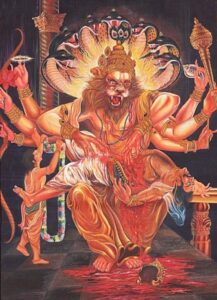 “O Lord of All Gods, you are the cause of creation, sustenance and destruction. The way jewels are strung in a string of necklace; in a similar manner you string the universe together. You are holding, creating and uniting this world. O Lord, you are illuminating this world as the sun and the moon. You are the lord of the universe, the fount of its life, its ultimate home, the guru of this world, its only witness and beyond its beginning and end; I salute you. You are an ocean of ultimate mercy. You are the supreme, the ultimate, above whom there is nothing; and you are beyond this too. You are like the sun which removes the darkness of the night which arises from the suffering of this existence. You are the friend of the poor and the weak. You are a self-created wondrous and special form of a rope. I salute that great lord who is draped in a cloth which is yellow like the pollen of the lotus flower, who carries a chakra, which breaks the shoulders of the enemies in great wars, who rescues the world with his teeth and protects it, who assumes the form of the Rig, Yajur and Sama Vedas, who is the form of the Yagnavarāha and whose eyes are the sun, moon and fire. I salute the One who is the Nṛsiṁha avatar, whose terrible teeth tear apart the enemies, and in whose glance, this existence in its cycle of creation-sustenance-destruction is created and re-created constantly—the Lord Murabairi, blue as a cloud, glowing like a blue jewel, residing in a cave in Nīlāchala, an abode of mercy, śaṅkha-chakra-gadā-padma holder and the destroyer of accumulated sins of those who bow before him.
“O Lord of All Gods, you are the cause of creation, sustenance and destruction. The way jewels are strung in a string of necklace; in a similar manner you string the universe together. You are holding, creating and uniting this world. O Lord, you are illuminating this world as the sun and the moon. You are the lord of the universe, the fount of its life, its ultimate home, the guru of this world, its only witness and beyond its beginning and end; I salute you. You are an ocean of ultimate mercy. You are the supreme, the ultimate, above whom there is nothing; and you are beyond this too. You are like the sun which removes the darkness of the night which arises from the suffering of this existence. You are the friend of the poor and the weak. You are a self-created wondrous and special form of a rope. I salute that great lord who is draped in a cloth which is yellow like the pollen of the lotus flower, who carries a chakra, which breaks the shoulders of the enemies in great wars, who rescues the world with his teeth and protects it, who assumes the form of the Rig, Yajur and Sama Vedas, who is the form of the Yagnavarāha and whose eyes are the sun, moon and fire. I salute the One who is the Nṛsiṁha avatar, whose terrible teeth tear apart the enemies, and in whose glance, this existence in its cycle of creation-sustenance-destruction is created and re-created constantly—the Lord Murabairi, blue as a cloud, glowing like a blue jewel, residing in a cave in Nīlāchala, an abode of mercy, śaṅkha-chakra-gadā-padma holder and the destroyer of accumulated sins of those who bow before him.
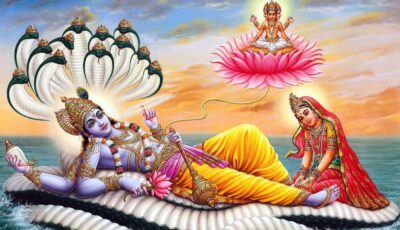
I worship Her whose eyes are beautiful like the lotus, in whose chest is the Kaustubh jewel marked by the Śrivatsya, whose lotus feet gives shelter and wealth to millions of people, whose creative force brings into existence the puruṣa and the prakṛti-the prakṛti which gives form to the non-form Brāhmāṅ, who is marked by the signs of goodness and well-being, and who sits in the heart of Nārāyaṇ, I salute that Lakṣmī.”
Jaimini said, Lord Śrikānta, pleased at Dharmarāj’s worship, signalled to the vīṇā holding Lakṣmī by his side. Lakṣmī told Yama, that this rare and precious region, Puruṣottama, was lorded by none, not even Brahmā and was Viṣṇu and Lakṣmī’s domain. The Divine Couple would never leave this place, not even when the kalpa ended. At the end of the kalpa, Brahmā would establish them. The sins of the evil souls get burned in an instant upon entering this place, the way cotton wool dissolves in fire. Gazing upon Lord Nārāyaṇa, the sinned souls are released instantaneously from the bondage of their karma. “You, Yama, have no hold over them here; so search for other places where you can lord over those who have sinned. Those who live here will never fall under your sway”.
Yama departed, he requested Goddess Lakṣmī to divulge the secrets of this place, the various pilgrimages, the presiding deity and the fruits of living here. “Why is it”, Yama queried, “that Viṣṇu creates bondages in other places but grants liberation only in this area”?
Jaiminiṛṣisaṅvāda (Chapter Three)
Mārkanḍeya Khāt
Śrī told Yama, “O Ravinandana, it is indeed praiseworthy that after coming into proximity of Viṣṇu, you have developed intelligence. I will describe the kṣetra to you, as perceived by me from the chest of the Lord. When this created universe was annihilated during pralaya, only two things existed – this kṣetra and me.”
Lakṣmī narrated the story of ṛṣi Mārkanḍeya, who at the end of the pralaya, was alive for seven kalpas, but could not find peace of mind or an appropriate dwelling place. Wandering through the waters of pralaya, he landed up at Puruṣottama kṣetra. This kṣetra does not erode in water, nor burn in the fire of kāla, nor dries or is perturbed. Amid the great upheaval of pralaya, it remains like a lifeboat. Mārkanḍeya saw a big Vaṭa tree, which was the body of Nārāyaṇa. During Mahā Pralaya, not even a leaf on this tree twitches. Mārkanḍeya gazed at the tree wondering, how did this tree survive pralaya, when everything, living and non-living, gets destroyed. A child’s voice emerged from nowhere and repeatedly asked him to approach the tree.
Mārkanḍeya approached this great tree and upon doing so, viewed Lord Nārāyaṇa and Devi Lakṣmī. Lakṣmī said, “O Son of Sūrya, upon seeing the śaṅkha-chakra-gadā holder Nārāyaṇa, and me sitting on his lap in padmāsana, Mārkanḍeya immediately regained his strength.” He fell upon the Lord’s feet and singing his praise and forgiveness, sought his protection and shelter. Mārkanḍeya said, “O Viṣṇu, today, after
On top of the canopy of leaves of this Vaṭa tree, lay a child. Lord Nārāyaṇa told Mārkanḍeya that this child represented the Kālātma, and if the ṛṣi entered his mouth he would get a shelter to reside.

0 comments